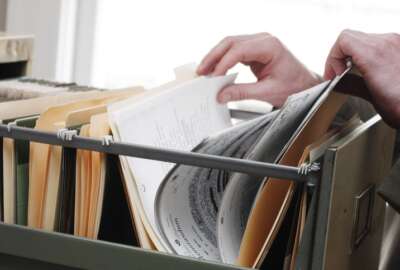

The memo also prohibits agencies from running their own on-premise record centers past the deadline.
The National Archives and Records Administration is, for now, sticking with its goal to no longer accept paper records from agencies beyond December 2022. But it is still processing agency feedback on how COVID-19 impacts their ability to meet this deadline.
The deadline, set in a joint memo with the Office of Management and Budget in 2019, looks to close the book on a decade-long process to move agencies to electronic records management. The memo also prohibits agencies from running their own on-premise record centers past the deadline.
The memo makes clear that after Dec. 31, 2022, NARA will no longer accept temporary or permanent records from agencies in a non-electronic format.
The pandemic, however, put much of this work on hold at agencies for more than a year. Fewer employees are able to report to the office to transfer paper records into electronic formats, and agencies have less access to support services with the closure of NARA’s 18 Federal Records Centers during the pandemic.
At this point, four Federal Records Centers remain closed, and the remaining centers are in either Phase 1 or Phase 2 of their reopening plans.
Laurence Brewer, NARA’s Chief Records Officer, said the pandemic gave agencies an added challenge meeting the deadline, but said it’s too early to say whether the Biden administration will give agencies more time to make the switch to electronic records.
“We understand that there have to be some conversations about the 2022 targets, and I expect those conversations will happen — they’re already happening within NARA. But we need to have those conversations with OMB as well, since it was a joint memo with OMB, and that has not happened,” Brewer said last week at a conference hosted by the Digital Government Institute.
NARA, meanwhile, is building up its capacity to support a greater volume of electronic records. The agency is in the process of standing up Electronic Records Archives 2.0, its program for scheduling, transferring and storing the electronic records it receives from agencies.
Brewer said the system will enable cloud-to-cloud transfers of electronic records between agencies and NARA, and is being built using agile technology and that NARA will make continuous improvements. NARA began work on ERA 2.0 in fall 2014, and is working with IBM on implementation.
“It is going to be an improvement on how agencies interact with the National Archives, to make sure that they can transfer records and do it in a secure way, and to ensure that the information is protected,” Brewer said.
Brewer said NARA expects to have an update on the status of ERA 2.0 later this year or early next year.
While the pandemic makes it harder for agencies to meet the e-records deadline, Brewer said it demonstrates that digital records and a fully electronic government “is not optional, it’s essential.”
“That has been made more evident over the past year, that we just can’t push paper around anymore. What’s been happening in agencies, I think, is that message has been carried up through senior leaders in agencies and the people who oversee and direct the strategic direction of records management programs within agencies,” Brewer said.
NARA will soon get a better picture of agency progress in meeting the electronic records deadline. Senior agency officials for records management recently submitted their annual reports to NARA. Brewer said the agency is still processing the governmentwide feedback.
“Making the targets and confidence in making the targets is one thing. We want to know how confident agencies are, but I think what’s more important is, let’s look at the data and where agencies are, and then see what it is that we can focus on,” he said.
NARA is also giving agencies more support to manage digital-native records. Brewer said NARA will soon issue new guidance focused on record-keeping for agency social media posts, web records management and other records that fall under the Electronic Messaging Preservation Act that Congress passed last December.
The agency is also wrestling with agencies’ ability to retain records from encrypted messaging apps like Signal and WhatsApp that federal employees use for day-to-day work.
“That’s a real issue, if you’re creating permanent records and they’re encrypted. They can’t be transferred to the NARA archives for preservation with that encryption of text messaging. That we’ve been talking about a lot,” Brewer said.
NARA is also working with the governmentwide Chief Data Officers Council to coordinate on best practices for data management.
Through its partnership with the General Services Administration, NARA is also giving agencies access to a marketplace of automation and artificial intelligence tools for records management through its Federal Electronic Records Modernization Initiative (FERMI).
Brewer said NARA is working with cross-government shared services — including financial management, cybersecurity, real property and travel — to bring records management into those shared services.
Copyright © 2025 Federal News Network. All rights reserved. This website is not intended for users located within the European Economic Area.
Jory Heckman is a reporter at Federal News Network covering U.S. Postal Service, IRS, big data and technology issues.
Follow @jheckmanWFED


